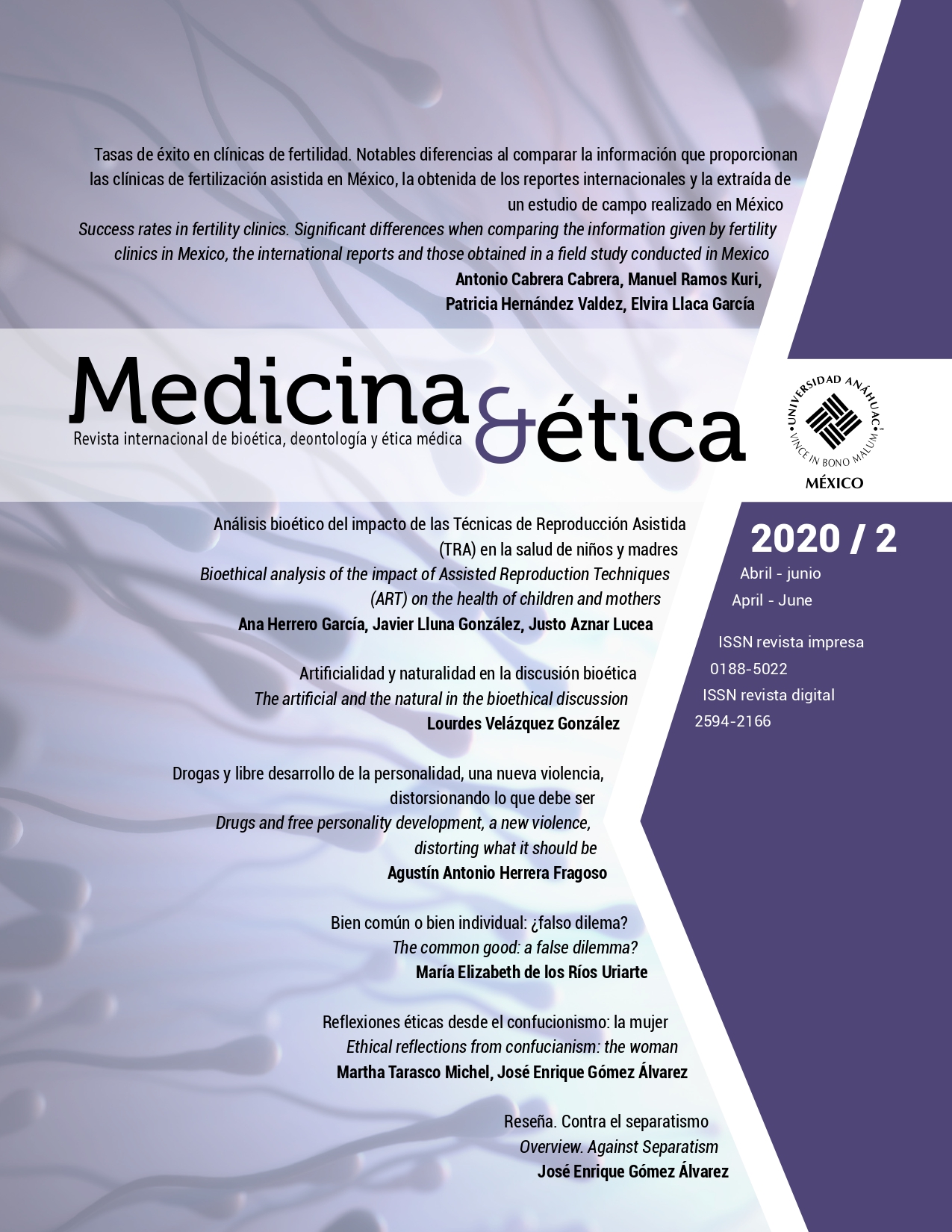The common good: a false dilemma?
Main Article Content
Abstract
The article addresses the problem of thinking of the common good as something alien to the individual good and provides reflections that overcome this dichotomy through Maritain’s thinking by betting on a harmony between the first and the second so that individuals and society can complement each other and seek their own development and improvement. Similarly, the reflection on the common good is complemented by reading from the principles of the Christian Social Doctrine to complement it.
Downloads
PLUMX Metrics
Article Details

This work is licensed under a Creative Commons Attribution-NonCommercial-ShareAlike 4.0 International License.
Medicina y Ética is distributed under a Creative Commons License Atribución-NoComercial-CompartirIgual 4.0 Internacional.
The author keeps the property rights with no restriction whatsoever and guarantees the magazine the right to be the first publication of the work. The author is free to deposit the published version in any other medium, such as an institutional archive or on his own website.
References
(2) DE AQUINO, SANTO TOMÁS. Suma Teológica, Parte I-II. C. 90. a. 2. Solución. BAC, Madrid.
(3) KANT, IMMANUEL. Crítica de la razón práctica. Sígueme, Salamanca; 2002, p. 52.
(4) NIETZSCHE, FEDERICO. El origen de la tragedia. [consultado el 15 de noviembre del 2019] Disponible en: http://www.edu.mec.gub.uy/biblioteca_digital/libros/N/
Nietzsche%20%20Nacimiento%20de%20la%20tragedia,%20El.pdf
(5) LÉVINAS, EMMNUEL. Totalidad e infinito. Sígueme, Salamanca; 2002.
(6) SAVATER, FERNANDO. Ética como amor propio. Grijalbo, Barcelona; 1998.
(7) CAMPS, VICTORIA. Paradojas Del Individualismo. Journal of Moral Education. Abingdon: Taylor & Francis Ltd. [consultado el 2 de diciembre del 2019] Disponible en: http://search.proquest.com/docview/232578036/
(8) TAYLOR, CHARLES. The ethics of autenticity. Harvard University Press, Estados Unidos; 1991.
(9) MACINTYRE, ALASDAIR. Tras la virtud. Crítica, Barcelona; 1987.
(10) WALZER, MICHAEL. Las esferas de la justicia, una defensa del pluralismo y la igualdad. FCE, México; 2001. https://doi.org/10.14482/eidos.21.4439
(11) NOZICK, ROBERT. Anarquía, Estado y Utopía. FCE, México; 1988.
(12) RAWLS, JOHN. A theory of justice. 4ª ed, Harvard University Press, Estados Unidos; 2001.
(13) MARITAIN, JAQUES. La persona y el bien común. Club de lectores, Buenos Aires; 1968.
(14) JAQUES, GENEVIEVE. Más allá de la impunidad. Un enfoque ecuménico de la verdad, la justicia y la reconciliación. Suiza Edit, Ginebra; 2001. https://doi.org/10.2307/j.ctvkwnnd4.7
(15) NUSSBAUM, MARTHA. Crear capacidades: propuesta para el desarrollo humano. Paidós, Barcelona; 2012. https://doi.org/10.5354/0717-8883.2014.31834
(16) HONNETH, AXEL. La lucha por el reconocimiento. Por una gramática social de los conflictos sociales. Grijalbo, Barcelona; 1997.
(17) RICOEUR, PAUL. La memoria, la historia y el olvido. Trotta, Madrid; 2003. https://doi.org/10.21555/top.v27i1.254
(18) GALTUNG, JOHAN. Essays in peace research. Vol. I. Christian Ejlers, Copenhaguen; 1975.
(19) Compendio de la Doctrina Social de la Iglesia. San Pablo, Chile; 2005.

